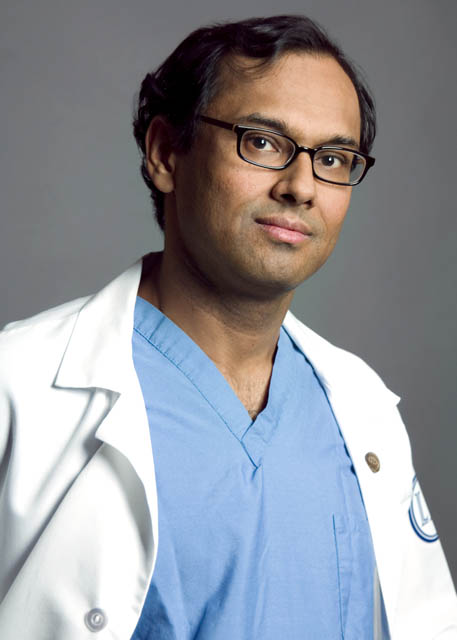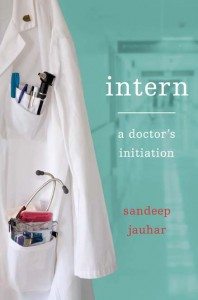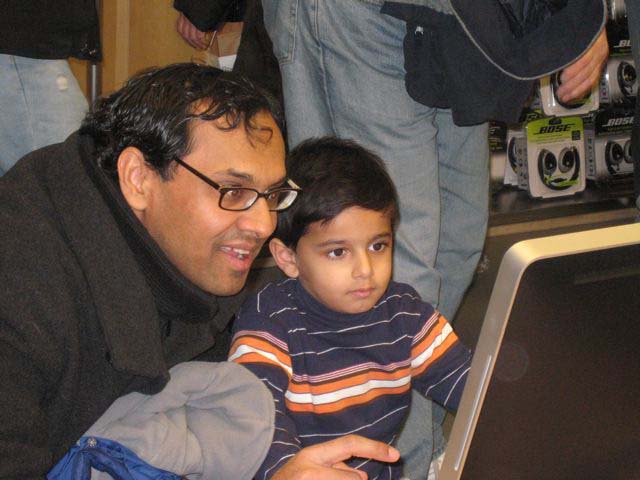
Dr. Sandeep Jauhar – Becoming a Doctor, Remaining a Human Being…
Doctors are considered omniscient Gods but are actually very human, and no one conveys this truth better than Dr. Sandeep Jauhar. He is Director of the Heart Failure Program at Long Island Jewish Medical Center in New York, specializing in novel therapies for acutely decompensated heart failure. It is hard to believe that this accomplished cardiologist once was a conflicted intern and probably no physician has been able to capture that coming of age story more evocatively than Jauhar in his remarkable first book, ‘Intern: A Doctor’s Initiation.’
This unflinching and honest look at an intern’s life was well-received. Wrote Time Magazine, “In Jauhar’s wise memoir of his two-year ordeal of doubt and sleep deprivation at a New York hospital, he takes readers to the heart of every young physician’s hardest test: to become a doctor yet remain a human being.”
Indeed, this self-awareness, honesty and empathy are what add to his qualities as a leader in his field. Jauhar became a physician in a roundabout way. The son of immigrants from New Delhi, he came to California by way of England and Wales. His father was a scientist, and Jauhar himself graduated Phi Beta Kappa from the University of California at Berkeley in 1989, and went on to earn a Ph.D. in experimental condensed-matter physics.
The death of a close friend made him think of moving into medicine. This had of course been the dream of his immigrant parents but he had rebelled against it, even though his brother Rajiv was already a successful cardiologist.
To Be A Writer – Or Not
Compounding the dilemmas of a career choice was his love of writing and he possibility of becoming a journalist. In school he had applied for and received a prestigious science journalism fellowship, leading to a summer internship at Time magazine in Washington DC. Later on, he had the gumption to call The New York Times and actually meet with the powers that be. In the long term this led to his writing for the Times.
“That was just another example of how important it is, sometimes when you’re young, not to know your own limitations, not to know what the etiquette is,” he says. “If I knew then what I know now about journalism, I never even would have thought of going to the top editor at the New York Times and asking him for a job. It was ridiculous but in the end it served me well.”

Jauhar finally opted for medicine at the relatively late age of 26, attending medical school at Washington University in St. Louis. He trained in internal medicine at the New York Hospital-Weill Cornell Medical Center in Manhattan, and completed cardiology fellowship training at New York University Medical Center, with specialized heart-failure training at Columbia Presbyterian Medical Center. Currently he is also Assistant Professor of Medicine at Albert Einstein College of Medicine.
An Intern’s Life
“I was an intern a decade ago now, but I still remember it the way soldiers remember war,” he writes in ‘The Intern.’ “After our son Mohan was born, my wife, Sonia, also a doctor, referred to the newborn period as a kind of internship, and it definitely wasn’t easy, staying up night after night. But taking care of a newborn was very different from internship.
In internship, when you were awakened in the middle of the night you had to be prepared to deal with almost anything – and in the worst possible state too. It didn’t matter if you felt like you were about to drop. You still had to be at the top of your game.”
This engrossing memoir is a must-read for anyone who’s ever doubted themselves and come out of the tunnel into the light, a competent professional. You can hardly put the book down as you follow the reluctant doctor-to-be as he passes through a trial of fire to emerge a full-fledged healer. You meet an amazing, colorful cast of characters and find that Jauhar is as skilled with words as he is wielding the scalpel. Always questioning medical practices, he wrote a piece for The New York Times as an intern, which caused quite a stir in the hospital.
Looking back on his internship years, he writes that medicine was more complex than he had imagined. “It was a glorious, quirky, inescapably human enterprise, with contentious debates, successes and failure, villains and heroes, oddities, mysteries, absurdities and profundities. It was a testament to the power of my profession that now I could not imagine a life without it.”
I had first interviewed him when the book had come out. Now three years later I asked him how life had changed for him since writing then. He says: “I was already a full-fledged cardiologist when I wrote the book so my professional life hasn’t changed that much – I do what I do every day which is take care of patients and manage congestive heart failure.”
However the eyes with which he sees these experiences have changed. “Perhaps the day to day work is not as dramatic as when I was an intern, the learning curve is not so steep and the experiences are not as new as they once were,” says Jauhar. “So in that sense, the internship is a great time to start writing; everything is new and you are also going through a very physically and emotional tumultuous year. That sort of mixes everything up in your mind and gives you insights which a more humdrum, mundane schedule may not.”
The Making of a Doctor
Gone are the sleep-deprived frenetic days of an intern with 80 hour workweeks. What’s life like now, as the director of the entire program? Jauhar has a packed day seeing patients who are hospitalized for heart failure, meets with new consultations, teaches the fellows and interacts with residents. As part of the NorthShore-LIJ Health System, which is one of the largest in the nation, he’s also working on a progressive, case-based curriculum for the Hofstra NorthShore- LIJ School of Medicine at Hofstra University.
Writing remains a passion but one that has had to take a backseat to his active work and family life. He and his wife Sonia, an endocrinologist, have two kids, Mohan 6, and Pia, 2. Playing with the kids and interacting in their lives means the writing is done late at night. He still writes for The New York Times and other publications

The Writing Life…
So is there another book inside of him, waiting to come out? “I think so. I’m starting to work on it – it’s still in the nascent stages,” says Jauhar. “One risks getting inured to the drama and the suffering that we see every day and the writing helps me to examine these issues in a fresh way so I don’t just accept it. It is hard to maintain that fresh perspective as you go on, in any field, as you accept the culture around you. That’s true in medicine as well.”
How does his writing evolve? “Writing is mostly editing – for me it involves putting a lot of thoughts down and seeing the threads. The way I’ve written the best is to allow my mind to be free and then let it go where it wants and see what comes out. The thing which really makes me passionate about writing is the personal issues and the emotions which my day to day work stimulates in me.”
Jauhar says he’s always looked at the world of medicine through a personal prism and for him, the patient-physician relationship is a fascinating one, and one he thinks about a lot.
The Patient-Physician Relationship
Asked about what gives him the most joy and satisfaction, he tells the anecdote about a current patient, a man with a serious heart condition in the cardiac arrest unit. “He’s been my patient for a couple of years now, a salesman for Coca-Cola. I’ve known him for several years and provided him with good care and stuck by him.” Joking about Classic Coke versus New Coke, Jauhar mentioned to the patient and his wife that while growing up, his favorite drink was RC Cola, which is now no longer being produced.
The next day, the wife brought him two hoarded bottles of RC Cola – turned out it was her favorite drink too. “And she brought them for me,” marvels Jauhar. “It’s little things like that that really make you appreciate what you do every day – it’s this appreciation from patients whom you’ve done right by. This may sound sentimental but it is those moments, those really tangible human moments that keep you going despite the hassles of clinical medicine.”
Does he have a personal philosophy which keeps him going through good times and bad? Sandeep Jauhar seems still very much a man who mulls over and analyzes the world around him. He says, “I think it’s really one of trying to extract the most meaning out of every day and every experience. More and more I’m trying to learn just to be a witness to what’s going on and not get too wrapped up in the trivialities of the moment.”
He adds, “And with medicine, there’s a lot you can bemoan, there’s a lot of hassle, especially today, but then these tender moments really are the ones that last. So I think that’s what it is – trying to find the true meaning and the thing that lasts, which is eternal, in the daily grind of what we do. It’s one of the reasons why I like to write – it is creating a sort of memorial of your life.”
© Lavina Melwani
(This article appeared in Hi Blitz)
The Series:
Siddhartha Mukherjee-Battling the Emperor
Sanjay Gupta, CNN”s Doctor to the World
Atul Gawande – A Checklist for Success
Abraham Verghese – The Healing Touchstone
Sandeep Jauhar – The Human Factor
